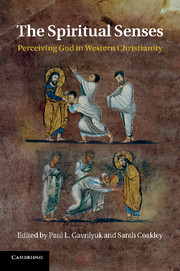Book contents
- Frontmatter
- Contents
- Contributors
- Foreword
- Abbreviations
- Introduction
- Chapter 1 Origen of Alexandria
- Chapter 2 Gregory of Nyssa
- Chapter 3 Augustine
- Chapter 4 Gregory the Great
- Chapter 5 Pseudo-Dionysius the Areopagite
- Chapter 6 Maximus the Confessor
- Chapter 7 Alexander of Hales
- Chapter 8 Thomas Gallus
- Chapter 9 Bonaventure
- Chapter 10 Thomas Aquinas
- Chapter 11 Late medieval mystics
- Chapter 12 Nicholas of Cusa
- Chapter 13 Jonathan Edwards and his Puritan predecessors
- Chapter 14 John Wesley
- Chapter 15 Karl Rahner and Hans Urs von Balthasar
- Chapter 16 Analytic philosophers of religion
- Select bibliography
- General index
- Index of select biblical references
- References
Chapter 4 - Gregory the Great
Published online by Cambridge University Press: 05 December 2011
- Frontmatter
- Contents
- Contributors
- Foreword
- Abbreviations
- Introduction
- Chapter 1 Origen of Alexandria
- Chapter 2 Gregory of Nyssa
- Chapter 3 Augustine
- Chapter 4 Gregory the Great
- Chapter 5 Pseudo-Dionysius the Areopagite
- Chapter 6 Maximus the Confessor
- Chapter 7 Alexander of Hales
- Chapter 8 Thomas Gallus
- Chapter 9 Bonaventure
- Chapter 10 Thomas Aquinas
- Chapter 11 Late medieval mystics
- Chapter 12 Nicholas of Cusa
- Chapter 13 Jonathan Edwards and his Puritan predecessors
- Chapter 14 John Wesley
- Chapter 15 Karl Rahner and Hans Urs von Balthasar
- Chapter 16 Analytic philosophers of religion
- Select bibliography
- General index
- Index of select biblical references
- References
Summary
When attempting to extract a precise theological position from Gregory the Great, bishop of Rome from 590 to 604, one is often confounded by his lack of systematic categories and his frequent variations in terminology. It is not surprising, therefore, that Gregory never articulated a comprehensive epistemological method nor did he conceptualize the spiritual senses in a philosophical fashion. This is not to say, however, that he lacked a cognitive theory or that he did not employ various applications of the spiritual senses. Indeed, a careful reading of the pontiff's corpus demonstrates that a theory of spiritual perception provides the foundation for his more explicit ascetic and pastoral theologies. By foregrounding the ascetic and pastoral dimensions of Gregory's thought, therefore, we can glimpse the principal elements of Gregory's understanding of spiritual perception – that the spiritual senses were diminished by the fall, that their recovery is, in large part, a consequence of ascetic progress and that God grants the greatest spiritual insights to those who are willing and able to share what they learn with others.
The following chapter is in two parts. The first part attempts to weave together Gregory's fragmented statements about true knowledge, concluding that a limited knowledge of God can be ascertained (primarily through the scriptures), so long as the aspirant is in good moral standing and is willing to share his or her insights with others. The second part argues that Gregory's application of the collective spiritual senses and his frequent use of expressions connoting individual senses, such as the ‘eyes of the mind’, were almost exclusively employed in a figurative manner to explain the cognition of spiritual concepts within the mind or soul. By exploring these two elements distinctly, we gain a better understanding of the extent to which Gregory's more explicit theological concerns were supported by a multifaceted theory of spiritual perception.
- Type
- Chapter
- Information
- The Spiritual SensesPerceiving God in Western Christianity, pp. 71 - 85Publisher: Cambridge University PressPrint publication year: 2011
References
- 1
- Cited by



